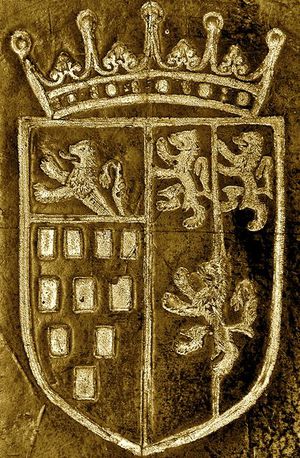Difference between revisions of "Robert Dormer 1610?-1643"
m (David moved page Robert Dormer to Robert Dormer 1610?-1643 without leaving a redirect) |
|||
| (One intermediate revision by the same user not shown) | |||
| Line 1: | Line 1: | ||
__NOTITLE__ | __NOTITLE__ | ||
===[[name::Robert]] [[name::DORMER]], 1st [[personal title::Earl of Carnarvon]] [[date of birth::1610]]?-[[date of death::1643]]=== | ===[[name::Robert]] [[name::DORMER]], 1st [[personal title::Earl of Carnarvon]] [[date of birth::1610]]?-[[date of death::1643]]=== | ||
| − | [[File:DormerRobert1.jpg| thumb | + | [[File:DormerRobert1.jpg| thumb | Armorial stamp of Robert Dormer (British Armorial Bindings) ]] |
====Biographical Note==== | ====Biographical Note==== | ||
Son of [[family::Sir William Dormer]], [[personal title::baronet]], a member of a wealthy landowning family with estates in [[location::Buckinghamshire]] and [[location::Oxfordshire]]; he inherited a great fortune at an early age. MA [[education::Exeter College, Oxford]] 1627, having previously taken a grand tour taking in not only [[location::France]], [[location::Spain]] and [[location::Italy]] but also [[location::Turkey]] and the near east. Created [[personal title::Viscount Ascott]] and [[personal title::Earl of Carnarvon]] 1628. He was noted as a wealthy playboy, with houses in [[location::London]] and [[location::Wing]], [[location::Oxfordshire]], with a regular presence at [[associates::Charles I]]’s court. He was a strong supporter of the King when the Civil War broke out and became a successful [[occupation::commander]] of troops in a number of battles and sieges, noted for his courage and military skill, including Edgehill (1642) and Roundway Down (1643). He was killed at the first Battle of Newbury. | Son of [[family::Sir William Dormer]], [[personal title::baronet]], a member of a wealthy landowning family with estates in [[location::Buckinghamshire]] and [[location::Oxfordshire]]; he inherited a great fortune at an early age. MA [[education::Exeter College, Oxford]] 1627, having previously taken a grand tour taking in not only [[location::France]], [[location::Spain]] and [[location::Italy]] but also [[location::Turkey]] and the near east. Created [[personal title::Viscount Ascott]] and [[personal title::Earl of Carnarvon]] 1628. He was noted as a wealthy playboy, with houses in [[location::London]] and [[location::Wing]], [[location::Oxfordshire]], with a regular presence at [[associates::Charles I]]’s court. He was a strong supporter of the King when the Civil War broke out and became a successful [[occupation::commander]] of troops in a number of battles and sieges, noted for his courage and military skill, including Edgehill (1642) and Roundway Down (1643). He was killed at the first Battle of Newbury. | ||
| Line 20: | Line 20: | ||
[[Category:Military]] | [[Category:Military]] | ||
[[Category:Earls]] | [[Category:Earls]] | ||
| + | [[Category:All Owners]] | ||
Latest revision as of 12:45, 17 July 2021
Robert DORMER, 1st Earl of Carnarvon 1610?-1643
Biographical Note
Son of Sir William Dormer, baronet, a member of a wealthy landowning family with estates in Buckinghamshire and Oxfordshire; he inherited a great fortune at an early age. MA Exeter College, Oxford 1627, having previously taken a grand tour taking in not only France, Spain and Italy but also Turkey and the near east. Created Viscount Ascott and Earl of Carnarvon 1628. He was noted as a wealthy playboy, with houses in London and Wing, Oxfordshire, with a regular presence at Charles I’s court. He was a strong supporter of the King when the Civil War broke out and became a successful commander of troops in a number of battles and sieges, noted for his courage and military skill, including Edgehill (1642) and Roundway Down (1643). He was killed at the first Battle of Newbury.
Books
One book is known with a gilt armorial stamp of Dormer on the covers (BL C.66.e.17), but as this is a Book of Common Prayer (1621) it is likely to have come from a family chapel and there is no evidence of a library as such.
Sources
- British Armorial Bindings.
- Roy, Ian. "Dormer, Robert, first earl of Carnarvon (1610?–1643), royalist army officer." Oxford Dictionary of National Biography.
